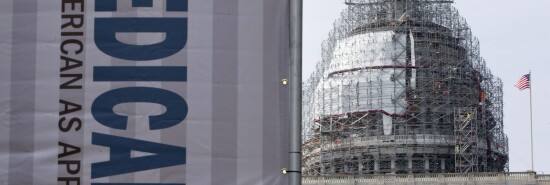
Bad medicine: Democrats push drug price-fixing into private sector
Washington Examiner
Video Embed
Democratic lawmakers keep prescribing more and more quack economic medicine. They do so before the previous dose has done its full measure of damage. And they do so even though preliminary results are disturbing and indicate nothing good.
Reps. Frank Pallone (D-NJ), Richard Neal (D-MA), and Bobby Scott (D-VA) introduced a bill in July, which they and fellow Democrats plan to push when Congress returns from August recess. The legislation would vastly expand socialized medicine in the prescription drug industry. If the bill becomes law, long-term patient health would suffer nationwide.
SOUTH DAKOTA STOCKPILING MORE PRESCRIPTION DRUGS DUE TO SHORTAGES
The misnamed Inflation Reduction Act that President Joe Biden signed a year ago directed the federal government to “negotiate” prices within the Medicare program for a small subset of brand-name medications. More plainly, the government would impose price controls.
The new bill would expand this by restricting prices for the same medicines in the private sector, not just in Medicare. Government commissars would dictate drug prices for an additional 180 million people without regard to the interplay of supply and demand that makes markets work.
Everybody wants lower prices; but there is no good and much damage done by a scheme that appears to work only in the short term, but not over time. The side effects are more harmful than the supposed disease. Common sense suggests major controversial changes shouldn’t be expanded before preliminary results are analyzed. Yet here, congressional Democrats want to push into the private market something the government for decades wasn’t even allowed to do for its own senior health program. This is reckless.
It also flouts available evidence on two fronts. First, no government “negotiation” is necessary because the market has kept prices down. Second, the side effects of last year’s price controls look awful.
When free markets operate, prices tend to settle over time. As medical patents or copyrights expire, generic drugs rush in and drive prices down. The initial high prices for new lifesaving medicines help pay for astronomical research and development costs and the costs of securing approval from the Food and Drug Administration.
When the government artificially sets prices, they can end up being a floor rather than a ceiling and a deterrent to innovation. When Congress passed the Medicare Part D prescription drug program in 2003, Democrats wanted to dictate a price of $35 for monthly insurance premiums for the average plan to pay for the drugs, with an inflationary adjustment each year. Republicans blocked this government “negotiation” scheme and, lo and behold, the average plan charged a premium of just $24, a third lower than the price Democrats wanted to dictate. Ever since then, the market has kept the average premium cost, which takes into account the real drug costs, significantly below what it would have been under the Democrats’ price-fixing fantasy.
Before Biden signed the Inflation Reduction Act last August, prescription drug prices were resisting inflationary pressures. Consumer prices for all goods and services jumped 9.1% between June 2021 and June 2022, with groceries rising even faster. Prescription drug prices, however, rose only 2.5%. Without government price controls, the market and deregulation under the Trump-Pence administration kept price hikes 70% smaller than inflation in the rest of the economy. The drug price pilot program in Biden’s bill, therefore, “solved” a nonexistent problem.
CLICK HERE TO READ MORE FROM THE WASHINGTON EXAMINER
A year later, price controls in Biden’s pilot program haven’t even gone into effect yet. But the mere threat of them has dissuaded drug companies from continuing to develop promising medications. With price controls soon to be imposed, companies would not be able to recover their investments.
Just since October, Alnylam, Eli Lilly, Insmed, Acadia, Protagonist, AstraZeneca, Bristol Myers Squibb, Merck, Amgen, and Sanofi have either canceled or announced probable cancellations of medicines for ailments ranging from bronchial problems to psychosis to various types of cancer. They all blamed Biden’s Medicare price controls for making their decisions necessary.
